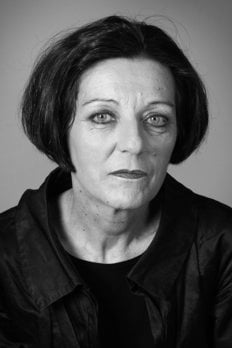Herta Müller
Biographical

Herta Müller was born in 1953 in Nitzkydorf, a German-speaking village in the Banat, a region that had passed from the Austro-Hungarian Empire to Romania in the wake of the First World War. During the Second World War, Romania had allied with the National-Socialist German Reich, and like many of the Romanian-Germans, Herta Müller’s father volunteered for Hitler’s Waffen-SS. Shortly before the end of the war Romania changed positions, and in January 1945, while the fighting was still on, Stalin ordered all Romanian-Germans between the ages of 17 and 45 to be deported to the Soviet Union to perform five years of forced labor. Among them was Herta Müller’s mother.
From 1973 to 1976, Herta Müller studied Romanian and German literature in Timişoara, where she befriended authors from the “Aktionsgruppe Banat,” a group of writers opposed to the Ceauşescu dictatorship and the official literature of the ruling socialist party. For Herta Müller, her father’s service as an SS soldier in the “Panzer Division Frundsberg” provided a frightening example of how individuals can be corrupted by ideology and opportunism – and inoculated her at a young age against similar structures within the communist ideology. Upon completing her studies, Herta Müller worked as a translator in a machine factory in Timişoara. In 1979 she was approached by the Romanian secret police (Securitate), but she refused to spy on her colleagues and foreign guests, and as a result she lost her job and could only find occasional employment.
Her first book Niederungen (English title: Nadirs) dates from this period, although it wasn’t until 1982 that a censored version appeared in Romania. In 1984 she published a collection of short prose in Romania entitled Drückender Tango; that same year an uncensored but abridged edition of Niederungen came out in Germany, making her name as a writer overnight. Told from the perspective of a young girl, with all her fantasies and fears, the book depicts the confinement, corruption, intolerance, and oppression of a Swabian village in the Banat. In the German media, Herta Müller openly criticized the communist dictatorship: as a result she was prohibited from publishing and repeatedly summoned by the Securitate for interrogations, where she was confronted with absurd accusations, reviled as a prostitute, charged with black marketeering, and threatened with death. In 1987 she emigrated to Germany together with writer Richard Wagner, her husband at the time. Since then she has lived in Berlin.
Even there, however, she was persecuted and threatened by the Securitate, in the perfidious manner described in her 2009 book Cristina und ihre Attrappe which is based on materials in her secret police file the author was able to obtain. The dossier revealed that only her reputation in Germany protected her from a trial that had already been prepared, on the trumped-up charge of being a foreign agent.
In the first book she wrote in Germany, which appeared in 1989 as Reisende auf einem Bein (English title: Traveling on One Leg), she portrayed the difficulties of finding a foothold in strange surroundings. Other novels followed about daily life in a dictatorship, difficult friendships, and the long arm of the secret police reaching into the private sphere – such as her 1994 book Herztier (English title: The Land of Green Plums) or the 1997 Heute wär ich mir lieber nicht begegnet (English title: The Appointment). Further publications include essays on her own poetics (Der König verneigt sich und tötet, 2003) and several volumes of collages combining images and text, most recently Die blassen Herren mit den Mokkatassen (2005).
In 2009 she published the novel Atemschaukel, about the deportation of the Romanian-German minority to the Soviet Union. Originally she wanted to write this novel together with the poet Oskar Pastior, who himself had been deported for five years of forced labor in what is now Ukraine. It is his detailed recollections that provide the basis of the novel. While they were still in the preparatory phase, Oskar Pastior died, and Herta Müller was forced to write the book alone. Atemschaukel is not only a moving depiction of the unknown deportation of the Romanian-Germans; in the voice of the protagonist Leo Auberg, it is also Herta Müller’s literary monument to Oskar Pastior.
This autobiography/biography was written at the time of the award and later published in the book series Les Prix Nobel/ Nobel Lectures/The Nobel Prizes. The information is sometimes updated with an addendum submitted by the Laureate.
Nobel Prizes and laureates
Six prizes were awarded for achievements that have conferred the greatest benefit to humankind. The 12 laureates' work and discoveries range from proteins' structures and machine learning to fighting for a world free of nuclear weapons.
See them all presented here.
